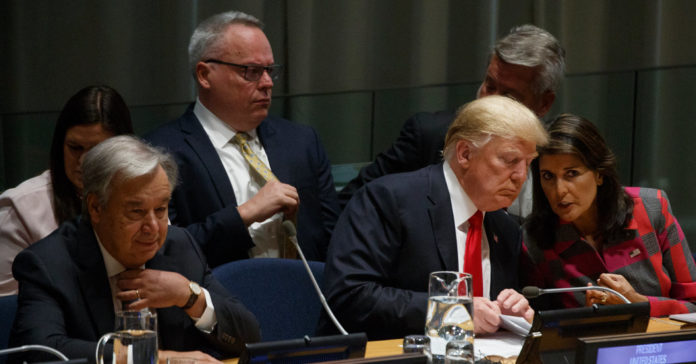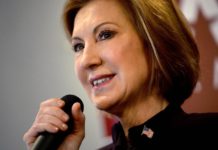UNITED NATIONS — President Trump on Tuesday defiantly reaffirmed his commitment to an “America First” foreign policy, lashing out at foes like Iran and failing states like Venezuela. But he singled out an enemy-turned-partner, Kim Jong-un of North Korea, expressing optimism for a diplomatic opening that would have seemed far-fetched even a year ago.
Speaking for a second time to the United Nations General Assembly, Mr. Trump said, “We will never surrender America’s sovereignty to an unelected, unaccountable global bureaucracy. We reject the ideology of globalism and we embrace the doctrine of patriotism.”
Mr. Trump lavished praise on his own efforts to shake up the global order, pointing to his withdrawal from the Iran nuclear deal and from several international organizations. He also promoted the results of his summit meeting with Mr. Kim in Singapore in June, claiming that his diplomacy had reduced the nuclear threat from the North.
“The missiles and rockets are no longer flying in every direction, nuclear testing has stopped, some military facilities are already being dismantled,” Mr. Trump said. “I would like to thank Chairman Kim for his courage and for the steps he has taken, though much work needs to be done.”
Mr. Trump saved his most excoriating words for what he called the “corrupt dictatorship” in Iran. He accused the Iranian government of looting its own people, and using the financial windfall from the nuclear deal to finance a terrorism campaign that is destabilizing the entire Middle East.
“Iran’s leaders sow chaos, death and destruction,” he declared. “They do not respect their neighbor or borders, or the sovereign rights of nations.”
“Not good,” he added.
Mr. Trump’s message drew a mostly stone-faced response from the audience in the General Assembly chamber. But there was one moment of levity, albeit at the president’s expense. When he declared that his administration “has accomplished more than almost any administration in the history of our country,” the audience broke out into murmurs and laughter.
Pausing, Mr. Trump said, “I did not expect that reaction.” Then he added, “But that’s O.K.”
Mr. Trump’s speech showed a president at once fickle and set in his ways: His emphasis on sovereignty was a repeat of the big idea in last year’s General Assembly address, and it showed that on the core principles of his “America First” foreign policy, Mr. Trump is not budging after 20 months in office.
Yet Mr. Trump’s warm words for Mr. Kim were a 180-degree shift from last year, when he called him “Little Rocket Man,” on a suicidal collision course with the United States. That showed he is open to radical shifts in approach, based on his idiosyncratic view of personal diplomacy and his self-avowed skill as a dealmaker in spotting opportunities.
As he did last year, Mr. Trump relied on his senior domestic adviser, Stephen Miller, for much of the speechwriting. Mr. Miller has spearheaded the White House’s immigration policy and its decision to cut back the number of refugees the United States will accept. The national security adviser, John R. Bolton, who is, if possible, an even more ardent proponent than Mr. Trump of the virtues of sovereignty, also injected themes.
For presidents, General Assembly speeches are a good guide to the evolution of their thinking. In 2009, his first year in office, Barack Obama delivered a soaring paean to the need for diplomacy and collective action, promising to seek a new start with Iran and thrusting the United States back into the climate change debate after eight years of George W. Bush.
By 2014, Mr. Obama had cast off some of his early ambitions and dwelt instead on the threat from the Islamic State. In his last speech, in September 2016, he called for a course correction in the march toward globalization, warning about the dangers of tribalism that were laid bare in Mr. Trump’s election victory two months later.
Mr. Trump has not yet faced a major foreign policy crisis, and his speech reflected his good fortune. He still spoke mostly about actions he had taken to unwind the legacy of Mr. Obama on climate change, trade, and Iran. With the exception of North Korea, he spoke less about how he had reacted to the challenges of a changing world.
Source : Nytimes














